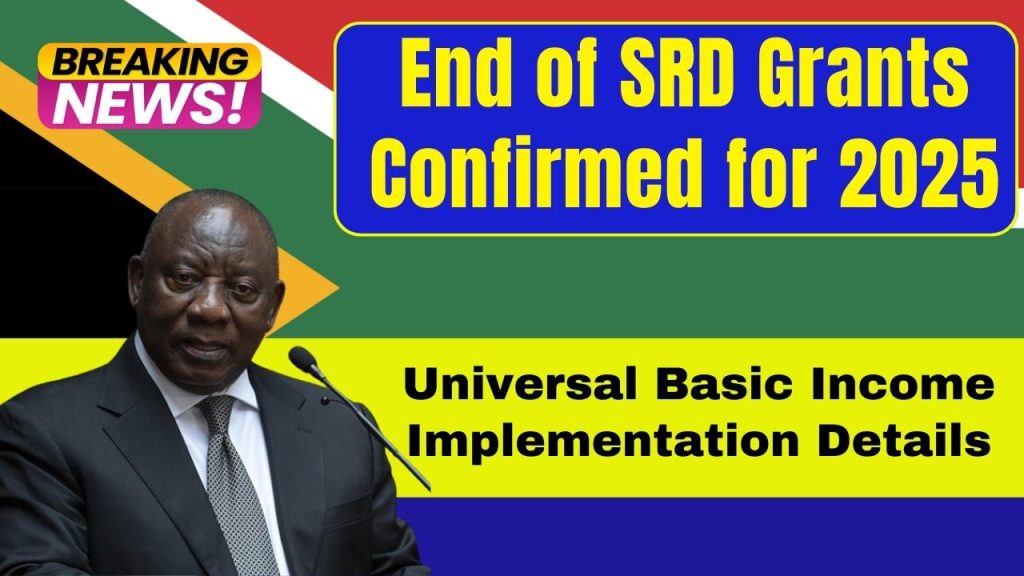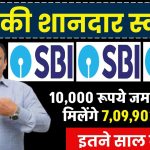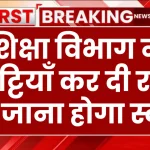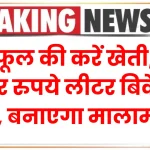
End of SRD Grants Confirmed for 2025: The South African government has officially announced that the Social Relief of Distress (SRD) grants will come to an end in 2025. This move paves the way for the implementation of a Universal Basic Income (UBI) program. The transition signals a significant shift in the country’s social welfare landscape, aiming to provide more consistent and inclusive financial support to citizens.
For millions of South Africans, the SRD grant was a lifeline during the COVID-19 pandemic. As the grant sunsets in March 2025, the new UBI program is expected to cover a broader demographic and simplify access to financial assistance. Here, we break down what this change means, who will benefit, and how the implementation will unfold.
End of SRD Grants Confirmed for 2025
| Aspect | Details |
|---|---|
| SRD Grant End Date | March 2025 |
| UBI Introduction | Transition to UBI begins in 2025 |
| UBI Eligibility | All South African citizens and permanent residents aged 18 to 59 |
| UBI Amount | Preliminary discussions suggest R800 to R1,200 per month |
| Budget for SRD 2024 | R33.6 billion allocated |
| Official Website | Visit SASSA Official Website |
The transition from SRD grants to Universal Basic Income marks a pivotal moment in South Africa’s fight against poverty and inequality. While challenges remain, the program’s potential to uplift millions of lives makes it a bold and necessary step forward. Stay informed and prepared as this transformative policy unfolds.
What Are SRD Grants?
The Social Relief of Distress (SRD) grant was introduced in 2020 to provide emergency financial aid to those impacted by the economic fallout of the pandemic. With a monthly payout of R350 (recently adjusted to R370), it supported over 10 million South Africans during challenging times.
Although initially intended as a temporary measure, the grant’s extension highlighted its importance in alleviating poverty and unemployment. Yet, the government recognizes that long-term solutions are necessary—enter the UBI program.
Why Were SRD Grants Important?
The SRD grants played a critical role in mitigating the economic damage caused by the pandemic. Many households relied on this financial aid to meet basic needs such as food, clothing, and shelter. Despite being temporary, the SRD grants exposed structural inequalities in the South African economy, demonstrating a need for more sustainable solutions.
What Is Universal Basic Income (UBI)?
Universal Basic Income is a financial assistance program designed to provide a fixed, unconditional payment to individuals, regardless of employment status or income. The goal is to create a safety net for all citizens, reduce poverty, and empower individuals with greater financial autonomy.
Key Features of South Africa’s UBI Plan
- Inclusive Eligibility:
- Covers all citizens and permanent residents aged 18 to 59.
- Unlike SRD grants, UBI will not require proof of unemployment or specific financial need.
- Monthly Payment:
- Expected range: R800 to R1,200.
- Designed to provide enough for basic necessities without discouraging employment.
- Gradual Implementation:
- The transition period will span one to two years, ensuring smooth integration.
- Simplified Administration:
- UBI will reduce bureaucratic hurdles and administrative costs, making it more efficient than the SRD grant system.
How Will UBI Be Different From SRD Grants?
While SRD grants were temporary and targeted at unemployed individuals, UBI offers universal coverage. This inclusivity removes the stigma often associated with social assistance and ensures that financial aid is accessible to all eligible individuals without bureaucratic obstacles.
How Will UBI Be Funded?
Funding UBI poses a significant challenge. The South African government is exploring multiple avenues, including:
- Increased Tax Revenue: Higher taxes on high-income earners and corporations.
- Reallocation of Budgets: Reducing expenditures in less critical areas to prioritize social welfare.
- International Loans and Aid: Securing external funding to bolster initial implementation.
For perspective, a universal grant of R1,000 per month for 35 million adults would require R420 billion annually, highlighting the importance of sustainable funding strategies.
Potential Economic Impact
The introduction of UBI is expected to have far-reaching economic consequences. By increasing the disposable income of millions of citizens, the program will likely boost local businesses, drive economic growth, and create a ripple effect in job creation.
Benefits of UBI
1. Poverty Alleviation
By providing a guaranteed income, UBI ensures that all individuals have access to basic needs like food, housing, and healthcare. It is a transformative step toward reducing inequality.
2. Economic Growth
Increased purchasing power for low-income households stimulates demand for goods and services, boosting economic activity. Countries like Kenya and Finland, which piloted UBI programs, reported positive economic outcomes.
3. Dignity and Autonomy
Unlike conditional welfare programs, UBI empowers recipients to decide how best to use the funds, fostering a sense of independence.
4. Improved Mental Health
Financial insecurity is a significant source of stress for many households. A guaranteed income can alleviate anxiety, leading to improved mental and physical health outcomes for recipients.
Challenges to Implementation
While the benefits are promising, several challenges must be addressed:
- Cost: Securing sustainable funding for such a large-scale initiative.
- Inflation Risk: Managing inflationary pressures caused by increased consumer spending.
- Political Resistance: Gaining support from all stakeholders, including opposition parties and private sectors.
Addressing Inflation Concerns
Economic experts argue that inflation risks can be mitigated through careful planning and phasing of UBI payments. By monitoring spending patterns and adjusting the program as needed, South Africa can avoid potential economic pitfalls.
Global Examples of UBI
Several countries have experimented with UBI, offering insights into its potential:
- Spain: Introduced a basic income scheme during COVID-19, paying €1,015 monthly to struggling households.
- United States: Issued $1,200 stimulus checks during the pandemic as a temporary form of basic income.
- Kenya: Piloted a long-term UBI program that showed improved livelihoods and reduced poverty among recipients.
Lessons From Finland
Finland’s UBI experiment highlighted several benefits, including increased happiness and well-being among recipients. Although critics argued that employment rates were unaffected, the program demonstrated the potential for social stability and improved quality of life.
Transition Plan: From SRD to UBI
The shift from SRD grants to UBI will be gradual. Here’s what to expect:
Phase 1: Preparatory Stage (2023-2024)
- Finalize UBI policy framework.
- Conduct public consultations and pilot programs.
- Develop distribution infrastructure.
Phase 2: Implementation (2025)
- Begin rolling out UBI payments to eligible individuals.
- Gradually phase out SRD grants.
Phase 3: Evaluation (2026)
- Assess program effectiveness and address any gaps.
Building Public Awareness
A crucial step in the transition process will involve educating citizens about the UBI program. Government campaigns, media outreach, and local engagement efforts will ensure that the public is well-informed.
Frequently Asked Questions (FAQs) About End of SRD Grants Confirmed for 2025
1. Who qualifies for UBI?
All South African citizens and permanent residents aged 18 to 59 will be eligible, regardless of employment status.
2. How much will UBI payments be?
The proposed amount ranges between R800 and R1,200 per month, subject to final approval.
3. Will UBI replace other social grants?
No. UBI will complement existing grants like child support and old-age pensions, focusing on the working-age population.
4. How can I apply for UBI?
Details about the application process will be available closer to the implementation date on the SASSA official website.
5. What happens to SRD grant beneficiaries?
Current SRD grant recipients will be transitioned into the UBI system, ensuring no gaps in financial assistance.











